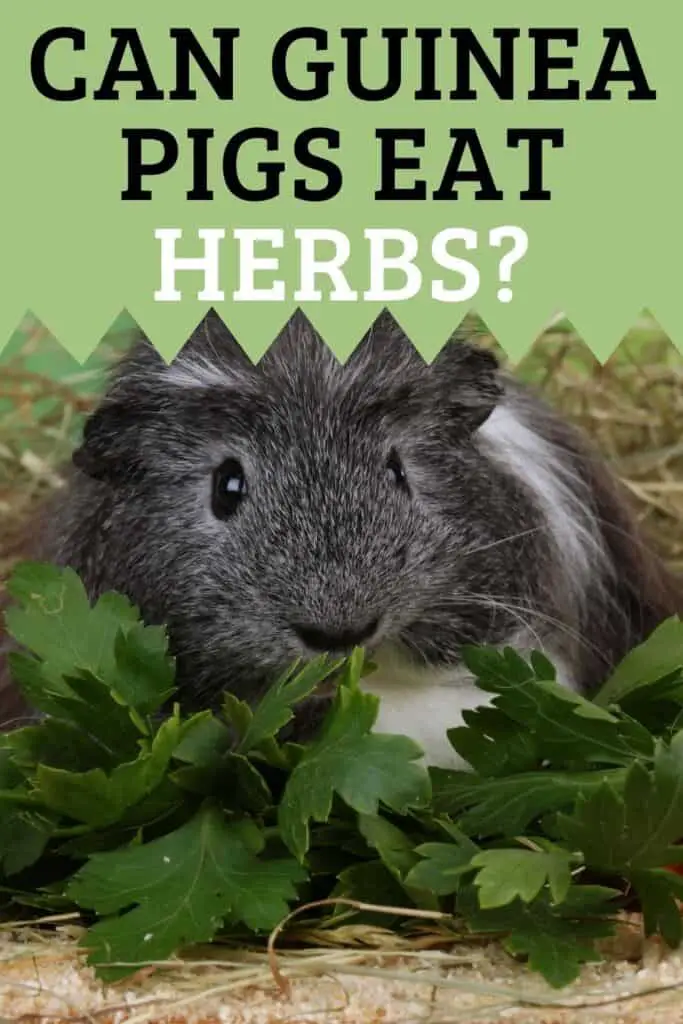Guinea pigs can eat several kinds of herbs. An herb is a plant or plant part, valued for its medicinal, savory, or aromatic qualities (according to Miriam-Webster).
Your guinea pig should have a well-rounded diet consisting of hay, pellets, and fresh produce, but they can enjoy certain herbs as a small treat or snack. Portioning is key, however. Due to the high calcium and oxalic content of most herbs, guinea pigs should enjoy these fragrant plants no more than a few times a week.
In the right portions, herbs can be a lovely source of essential nutrients, such as vitamin C (which guinea pigs cannot produce themselves), vitamin K, fiber, and more.

Table of Contents
What Herbs Can Guinea Pigs Eat?
So, what herbs can guinea pigs eat? Lots! The main thing you have to keep in mind when feeding guinea pigs herbs is the calcium content, along with how much oxalic acid the herbs have.
You see, guinea pigs really do not need any extra calcium; an excess will even affect them negatively, causing issues like UTIs, kidney stones, etc.
In the proper portions, plenty of herbs can be guinea pig-safe, however. In fact, herbs can be a good source of essential nutrients, such as vitamin C and fiber. The herbs you offer should always be fresh, and you will want to wash them really well.
Without further ado, in answer to ‘can guinea pigs eat herbs,’ they can, and here are some of the most beneficial:
Thyme
Did you know that thyme is rich in vitamin C? It is, and your guinea pig can eat it safely, as well. Most guinea pigs seem to like the taste of thyme OK. It also contains vitamins that support the immune system, like the antioxidants manganese and vitamin A.
Like most herbs, thyme is also high in calcium, so your guinea pig should only have a tiny amount, 2-3 times a week.
Parsley
Guinea pigs tend to enjoy parsley quite a bit, which is great because it’s full of vitamin C. In fact, this is one of the best herbs that you can feed your cavie! This being said, parsley also contains a lot of calcium and oxalic acid, both, so portioning is as important as ever.
Basil
Basil contains manganese, iron, vitamin A, and vitamin K.
As with most herbs, there is also a lot of calcium in basil. Your guinea pig should have no more than a couple of leaves, a few times a week.
Cilantro (AKA Italian Parsley or Coriander)
Though this herb has a fair bit of calcium and oxalic acid, Guinea pigs may have a couple of leaves of cilantro as a bi-weekly snack. They will most likely find the pungent odor unappealing, however.
Dill
Guinea pigs may occasionally sample a sprig of dill. This popular herb also contains a fair bit of calcium and oxalic acid, and your guinea pig may not like the flavor.
Mint
Guinea pigs may have just a little bit of mint, despite the fact the calcium content is high. Offer your cavie no more than a few small mint leaves, at most 1-2 times a week. Whether guinea pigs enjoy mint or not depends on the individual.
Mint also contains potassium, magnesium, phosphorus, iron, vitamin C, and vitamin A.
Fennel
Guinea pigs tend to really like both the stems and leaves of fennel. Luckily, this is an herb they can safely have. Just portion it out with care, as it is calcium-rich, as well. Offer fennel to your guinea pig no more than 2-3 times a week.
Go Slowly When Introducing Any Foods that are New
When introducing any new herb or other food to your guinea pig, you must go slow. Some herbs may simply not agree with their body, and no matter what, they will need time to adjust to anything new!
Herbs that Guinea Pigs Should Not Eat
- Chives. Chives are deadly-poisonous to most animals, including guinea pigs, as are garlic, onions, and shallots. This is because these contain disulfides, which damage their red blood cells, though the fatal effects may take a little bit to show.
- Oregano. Too much calcium.
- Rosemary. Too much calcium, and too little known about its effects on guinea pigs overall.
- Tarragon. Too much calcium.
- Sage. Sage is not healthy for guinea pigs to digest, as it is full of essential oil.
- Yarrow.
- Any herb that you are not 100% sure of.
Final Thoughts
As you can see, guinea pigs can actually have a pretty decent variety of herbs! That is, as long as they are portioned properly. This way, your guinea pig can avoid the harm from excess calcium and oxalic acid, while receiving the benefits of nutrients like fiber, and precious vitamin C!
Plus, guinea pigs love variety, and they will rarely complain when you spice up their meal.




